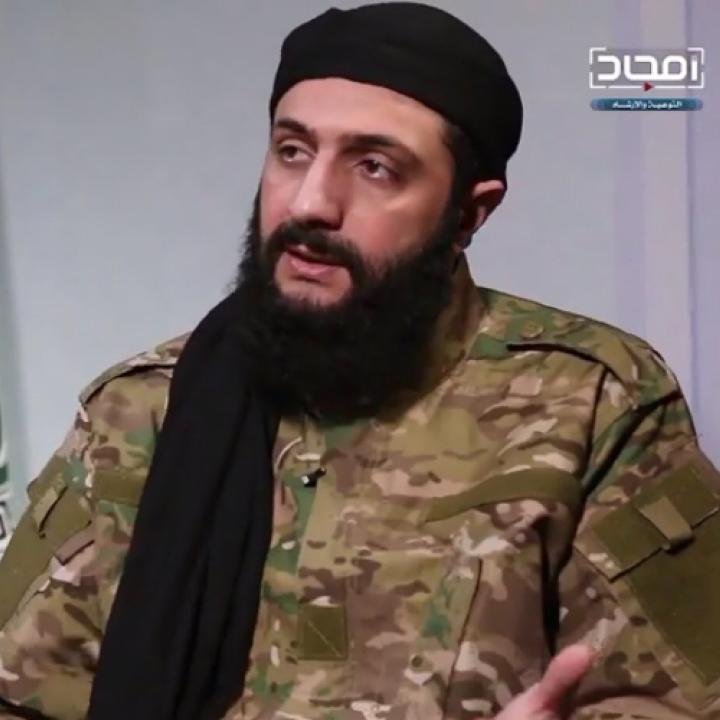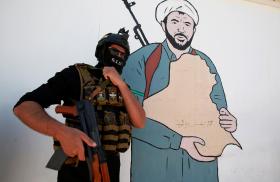
- Policy Analysis
- Articles & Op-Eds
Why Is It So Difficult to Get Off a Terrorist List?
Also published in Lawfare

Strategic priorities, political factors, and institutional inertia make it hard to remove a group from government lists even if it no longer meets the designation criteria, potentially hog-tying U.S. policymakers.
Hayat Tahrir al-Sham (HTS) set an unconventional precedent last year when it became the first jihadi group to seriously call for the United States to delist the group as a foreign terrorist organization. In an interview with Martin Smith of PBS’s Frontline in February 2021, HTS leader Abu Muhammad al-Jawlani objected to the organization’s designation, calling it “an unfair categorization.” He continued: “It’s a political label that carries no truth or credibility, because through our 10-year journey in this revolution, we haven’t posed any threat to Western or European society: no security threat, no economic threat, nothing. That’s why this designation is politicized. We call on countries that took these measures to revise their policies towards this revolution.”
It is true that HTS has changed quite a bit since the organization was founded in January 2012; notably, it broke away from the Islamic State in April 2013 and al-Qaeda in July 2016. But there are a number of likely barriers that HTS faces with regard to getting fully delisted by the U.S. government that are beyond the organization’s control. There are three reasons it is unlikely to happen any time soon: U.S. strategic priorities, the State and Treasury departments’ political considerations, and general institutional inertia. These issues are acceptable for U.S. policy for now, even if they aren’t ideal. HTS still meets the legal threshold for designation, though the case is far weaker than it used to be—but if that were to change, it could hamstring future policy efforts to undermine adversarial states in the Syrian arena, including the Assad regime, Russia, Iran, and Iran’s proxy network.
HTS originated as Jabhat al-Nusrah and sought to be another cog in the global jihadi movement—though one that learned the lessons of the failures of the Iraq jihad a decade prior. Today, HTS seeks to build its legitimacy within the local milieu it controls in northwestern Syria. This shift toward a more local focus happened gradually, as dynamics shifted in the Syrian civil war and strategic and ideological divides opened between Jawlani and the leadership of HTS’s allies, first with the Islamic State and later al-Qaeda. This is what makes HTS so complicated from a U.S. policy perspective: It has disavowed global jihad but retains extremist views and acts as an authoritarian regime in the areas it controls. If the group earnestly opened up its political system beyond an elite coterie of men and disavowed the terrorism of Hamas or attacks related to alleged cases of blasphemy in the West, it could potentially provide a real starting point for Washington to take Jawlani’s requests seriously.
From a U.S. government perspective, reconsidering HTS’s status as a terrorist group is not a priority. Over the past few years, there has been a shift in Washington’s focus and resources vis-a-vis issues related to the jihadi movement. It is no longer at the top of the agenda, as it had been for almost two decades. With institutions pivoting to competition with China and Russia, the bandwidth for terrorism-related issues is narrower. Further, even within the counterterrorism space itself, HTS is a particularly low priority. The Islamic State and al-Qaeda take precedence, because they are perceived to be actual threat actors that can harm U.S. and allied interests and security directly. HTS, though, has moved toward fighting only against the Assad regime and its allies in Syria, and has disavowed external operations; this has lowered the risk from the U.S. point of view. In many ways, HTS’s transformation away from an anti-U.S. agenda has made the group less relevant to U.S. policy.
Though decisions about terrorism designations are based on facts, taking a group off a list can be controversial and perceived as a political decision, especially if a group remains active. The controversy over delisting the Iranian-backed Yemeni Houthis, even as they continued to conduct terror attacks against Saudi Arabia and the United Arab Emirates, provided fodder to opponents of the Biden administration’s policies. Of course, no one in government wants to be viewed as soft on terrorism, and the way that GOP-aligned media amplifies security-related criticism can create domestic political issues for Democrats, as was seen with the political theater related to the 2012 attack on U.S. diplomatic facilities in Benghazi, Libya.
People in the U.S. government have also expressed concerns to me that even if a group like HTS has transformed, they still worry that the group could revert back to insurgency and terrorism tactics if the Assad regime and its allies decided to take back the territory that HTS controls. HTS would be landless and no longer able to use state-building as a form of alternative legitimacy. Those I talked to in government see it as a potential opportunity for HTS to once again also link up with al-Qaeda—though, from my point of view, this seems unlikely. These hypotheticals extrapolate from a lot of what-ifs, but good policy planning isn’t based on best-case scenarios and needs to account for the worst political risks and backlash.
These political considerations have consequences. One consequence is institutional inertia, which causes these types of decisions to take a long time. Usually, a group is delisted only after it has been defunct for some time or there is a positive U.S. interest that doesn’t have large political downsides, such as taking the FARC off the terrorism list following its peace agreement with the Colombian government. Without a pressing interest, groups and individuals can linger on the list for years. The most egregious case of institutional dysfunction related to terrorism designations is that of Nelson Mandela, who remained designated until 2008, even though he had disavowed terrorism more than two decades before and had been the leader of South Africa following the fall of the apartheid regime.
Since 9/11, only five jihadi groups have been taken off the terrorism list, with two of these delistings happening just earlier this year: the Algerian Armed Islamic Group (GIA) in October 2010, the Moroccan Islamic Combatant Group (MICG) in May 2013, the Libyan Islamic Fighting Group (LIFG) in December 2015, and most recently the Egyptian Gama’a al-Islamiyya (GI) and the Palestinian Majlis Shura al-Mujahidin fi Aknaf Bayt al-Maqdis (MSM-BM) in May 2022. Each of these groups was defunct when taken off the list. No jihadi group has ever been delisted while it continues active operations. Even when these groups ceased to function, inertia (and probably political concerns as well) continued to play a role. The timing of these groups’ delistings seems a bit random, too. It took about six years after the GIA ceased its activity for it to be removed from the list, nine years for the MICG, four years for the LIFG, 24 years for the GI, and nine years for MSM-BM.
Other terrorist organizations could potentially be similarly delisted. There are a number of jihadi groups that remain on the list but are for all intents and purposes defunct—because they either stopped operating or merged into another group like the Islamic State. For example, the Abu Sayyaf Group in the Philippines has not claimed an attack in three years, the Islamic Movement of Uzbekistan in seven years, Indonesia’s Jemaah Islamiya in at least five years, the Uzbek Islamic Jihad Union in 13 years, Ansar al-Din in Mali in five years, Ansar al-Sharia in Libya in six years, and Ansar al-Sharia in Tunisia in eight years. Even more confounding, the leadership of Lebanon’s ‘Abd Allah ‘Azzam Brigades announced the dissolution of the organization in November 2019, at which point it hadn’t conducted an attack in four years, but it remains on the list. There seems to be no clear criteria or metrics for delisting, and no standard for how long after a group ceases its activity that the government will revisit its designation. Yet, according to the law, there is supposed to be a five-year review window process for each designation. This inconsistency in the process highlights the role of bureaucratic inertia and the low prioritization of reevaluation.
Nonetheless, HTS still faces other challenges to delisting. Even if HTS were hypothetically to be taken off the State Department’s foreign terrorist organization list, there remains the Treasury Department’s specially designated global terrorists list, which has also listed HTS as a group and the organization’s leadership as individuals. Thus, key leaders in HTS could still conceivably be designated. Jawlani, in his comments, notably called for HTS to be delisted by all countries and organizations that have placed it on terrorism lists. Beyond the terrorism lists maintained by the U.S. government, there is also the United Nations’ terrorism list, which places individuals and groups, including HTS, under sanctions. The United States is legally bound to follow the U.N. list. HTS is likely to remain on the U.N. list for the foreseeable future; Russia can use its seat on the Security Council to support its ally in Syria, the Assad regime, and reinforce its view of HTS as a terror threat.
Despite Jawlani’s aspirations, the barriers to HTS being taken off any terrorism lists, in the United States or elsewhere, are high. The group’s behavior and rhetoric remain extreme, and so the status quo seems acceptable. But even if the group ceased to meet the legal threshold for designation, delisting could take years. As a consequence, the issue is moot in some ways, due to factors that have more to do with the strategic, political, and institutional calculations of the U.S. government than with the actions of the group itself. HTS is unlikely to be delisted any time soon, but Jawlani’s unusual request raises serious questions about what exactly the policy process for delisting terror groups is and suggests that clearer standards may be in order.
Aaron Y. Zelin is the Richard Borow Fellow at The Washington Institute and author of its recent study The Age of Political Jihadism: A Study of Hayat Tahrir al-Sham. This article was originally published on the Lawfare website.


